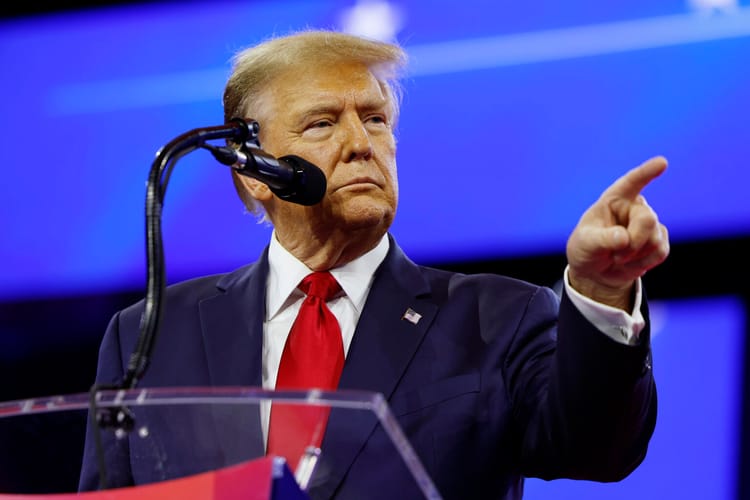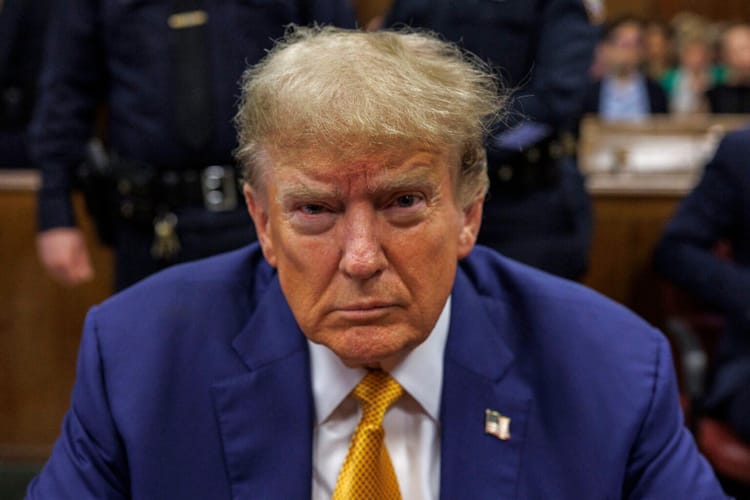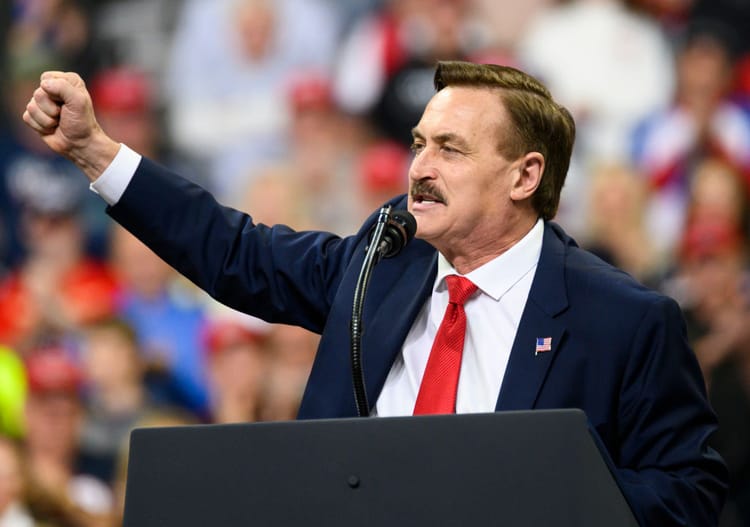Trump pleads not guilty to charges he sought to subvert 2020 election

By Ashley Murray, Minnesota Reformer
WASHINGTON — Former President Donald Trump pleaded not guilty to four felony charges Thursday in U.S. District Court in Washington, D.C., after a federal grand jury handed up an indictment against the former chief executive.
Trump, the front-runner in the 2024 GOP presidential primary, was released under the conditions that he must not violate federal, state or local law and must not communicate with witnesses about the facts of the case, unless in the presence of counsel.
The first hearing in the case is set for Aug. 28 at 10 a.m. before U.S. District Judge Tanya Chutkan.
Chutkan is willing to waive Trump’s appearance at the first hearing.
Trump entered Courtroom 22 inside the E. Barrett Prettyman Courthouse at 3:52 p.m. and sat between his lawyers, John Lauro, to his left, and Todd Blanche, on his right.
A limited number of reporters were allowed in the courtroom and more in two media overflow rooms, but no photographs or video were permitted.
For just over 20 minutes the former president, dressed in a red tie and blue suit, sat folding and unfolding his hands and exchanging whispers with the attorneys while waiting for Magistrate Judge Moxila A. Upadhyaya to begin the proceeding.
U.S. Department of Justice Special Counsel Jack Smith, who brought the indictment, watched from just beyond the prosecution’s table.
The court gaveled in at 4:15 p.m.
Trump, 77, remained silent except to deliver his name, age, confirmation that he understood the charges, and his plea.
“Yes, your honor, Donald J. Trump, John. 7-7, 77,” he told the magistrate.
At 4:23 p.m. Trump stood as Upadhyaya began the formal arraignment.
“You have the opportunity to enter a formal plea,” she told Trump, whose legal team waived a formal reading.
“Not guilty,” Trump answered in a quiet voice.
“I ask you to please listen carefully to the warnings I’m about to give you,” Upadhyaya said.
She told Trump that the “most important” condition of his release is that he not break any laws, otherwise he could face a warrant for his arrest, risk being held pending trial or face a longer sentence.
Upadhyaya said that Judge Chutkan intends to set a trial date and expected trial length at the upcoming hearing.
Trump’s legal team objected, asking for more time to review the “magnitude of discovery,” Lauro said.
“For the government to suggest this case could be tried within the Speedy Trial Act motion is absurd,” Lauro said.
A “speedy trial” is required by law to commence within 70 to 90 days after an indictment or from the date the defendant appears in court.
“This case, just like any other case, will benefit from normal order, including a speedy trial,” U.S. Department of Justice prosecutor Thomas Windom said.
Upadhyaya gave Trump’s team five days to submit a written request for more time. The government will then have five days to respond.
The hearing ended at 4:42 p.m. Trump and his team left a few minutes after Upadhyaya.
Trump decries charges
Just before boarding his flight back to his home in Bedminster, New Jersey, Trump spoke for less than a minute with reporters, holding an umbrella as rain fell. He said the prosecution was political and called the proceeding “a very sad day for America.”
“This is a persecution of a political opponent,” he said. “This was never supposed to happen in America.” He did not take questions.
A federal grand jury on Tuesday indicted the former president on four counts, including conspiracy to defraud the United States; conspiracy to obstruct an official proceeding; obstruction of, and attempt to obstruct, an official proceeding; and conspiracy against rights.
The former president could face no more than five years in prison for the first charge against him, and not more than 20 years for each of the following three charges. Each charge could carry a fine of not more than $250,000, and could require up to three years of supervised release.
Alina Habba, an attorney for Trump, said in a brief appearance outside the courthouse before the arraignment that the prosecutions of the former president were politically motivated. Officials with the U.S. Justice Department are seeking to keep Trump “distracted” as he campaigns to unseat President Joe Biden, she said.
“This is about politics, this is about 2024,” she said. “Period, the end.”
Trump had the right to dispute the election results, Habba added. While the indictment says Trump was told by several close advisers that he had no chance of legally overturning the election, that advice did not cancel Trump’s right to challenge the results, she said.
Trump told supporters gathered on Jan. 6, 2021, to “go patriotically and peacefully” to the Capitol, she noted.
Outside the courthouse, tourists and TV crews
On the sidewalks outside the courthouse, tourists walked next to temporary white canopy tents where dozens of journalists were giving live reports on television about the indictment and the events unfolding in the courtroom.
Dozens of protestors, both supporting Trump and calling for him to go to prison, chanted and in some cases sang.
At least two protestors wore fake jailhouse costumes, pressing for Trump to be locked up, while many Trump supporters wore campaign T-shirts and waved flags.
Above the crowd, half a dozen people watched from an apartment complex that overlooked the courthouse. A couple of onlookers on a balcony used binoculars to try to get a glimpse of the former president arriving at the courthouse. Yellow “Do Not Cross” tape was wrapped around removable bike barricades.
Winding through the crowd was a man in a white fedora pulling a cart displaying and selling anti-Trump buttons. One button had a picture of Special Counsel Jack Smith, with “TRUMP DON’T KNOW JACK!” written on it.
Trump’s multiple indictments
The 45-page indictment says that despite knowing his statements were false, then-President Trump continued to repeat that he won the election, working with co-conspirators to directly pressure state officials and hatch a plan to switch out legitimate slates of electors in states Biden had won with false electors recruited by Trump and his advisers.
Those states include Arizona, Georgia, Michigan, Nevada, New Mexico, Pennsylvania and Wisconsin.
Federal prosecutors wrote that Trump and his co-conspirators’ “prolific lies about election fraud included dozens of specific claims that there had been substantial fraud in certain states, such as that large numbers of dead, non-resident, non-citizen or otherwise ineligible voters had cast ballots, or that voting machines had changed votes for the Defendant to votes for Biden.”
The indictment also details a pressure campaign by Trump to convince Vice President Mike Pence that he could obstruct the certification of the votes, a largely ceremonial role that was scheduled to occur Jan. 6, 2021.
That day, Trump rallied supporters, urging them to descend on the U.S. Capitol after repeatedly falsely telling them that Pence could stop the proceeding.
A violent crowd attacked the Capitol, chanting “Hang Mike Pence,” and injuring law enforcement officers.
The allegations outlined in the indictment handed up Tuesday mirror conclusions that the U.S. House Select Committee to Investigate the January 6, 2021, Attack on the U.S. Capitol made following the panel’s two-year probe.
The indictment marks the third this year for Trump.
The former president faces federal criminal charges in Florida — the first levied against a former U.S. president — on allegations he kept, and refused to return, classified materials after he left office.
He also faces criminal charges in New York state, where he’s accused of falsifying business records by using campaign funds to cover up an affair.
He has pleaded not guilty in both other cases.
A sweeping Georgia 2020 election interference probe also could lead to high-profile criminal indictments being handed down for Trump and potentially others in Fulton County Superior Court.
D.C. Bureau reporters Jennifer Shutt and Ariana Figueroa contributed to this report.
Minnesota Reformer is part of States Newsroom, a network of news bureaus supported by grants and a coalition of donors as a 501c(3) public charity. Minnesota Reformer maintains editorial independence. Contact Editor Patrick Coolican for questions: info@minnesotareformer.com. Follow Minnesota Reformer on Facebook and Twitter.





Member discussion